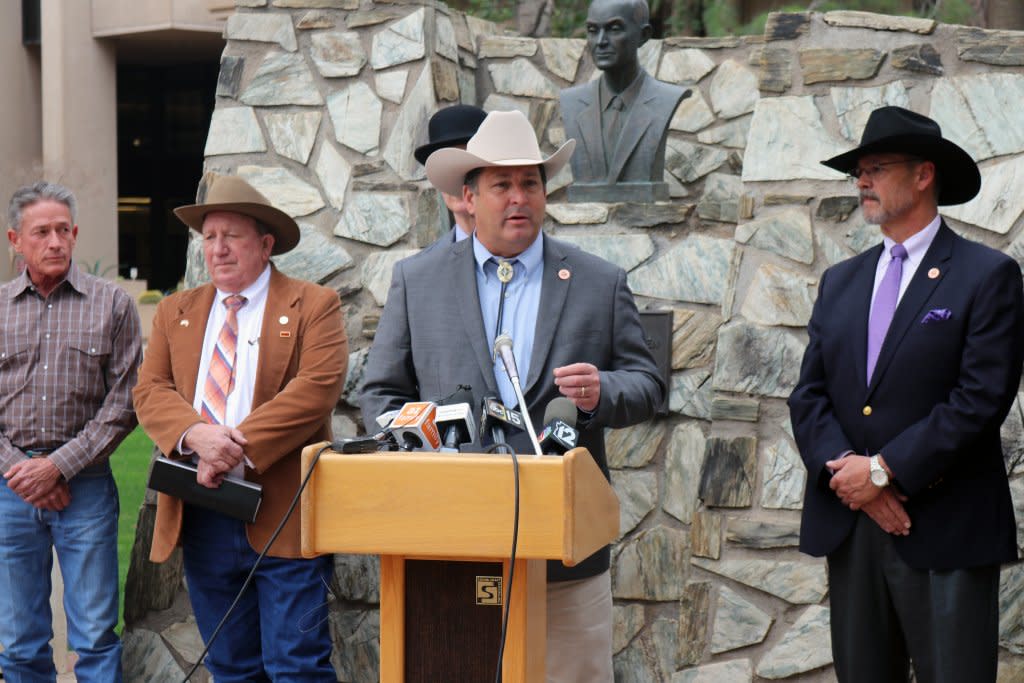Supreme Court says Cook will be on the ballot, GOP attorney asks for reversal of sanctions

- Oops!Something went wrong.Please try again later.
- Oops!Something went wrong.Please try again later.
Rep. David Cook, R-Globe, speaks to the press in 2019 about the concerns of farmers in Pinal County about a drought contingency plan. He's now running for state Senate. Photo by Jerod MacDonald-Evoy
Republican David Cook’s name will be on the primary ballot for the Arizona Senate’s Legislative District 7, the Arizona Supreme Court decided on Thursday.
His opponent, Republican incumbent Wendy Rogers, attempted to get him kicked out of the race by challenging the majority of the voter signatures he gathered to make it onto the ballot, but both the trial court and the state’s highest court dismissed her claims.
Cook, a state representative from Globe, and Rogers differ greatly in politics, even as members of the same party. Rogers built a national profile on election denialism after former President Donald Trump lost the 2020 election, while Cook is more of a throw-back to what Republican elected officials were like before Trump dominated the GOP.
GET THE MORNING HEADLINES DELIVERED TO YOUR INBOX
Candidates for elected office in Arizona must collect a certain number of nomination petition signatures from registered voters they hope to represent to qualify for the ballot, but then those signatures can be challenged in court, most often by their political opponents.
Most of the signature challenges filed this year have already been resolved, when the challenger dropped the case, the candidate who was challenged dropped out of the race or a judge dismissed the case.
But after Rogers’ challenge, in which she initially claimed that almost all of the signatures — 1,033 of 1,344 — that Cook gathered were invalid, was dismissed by a trial judge, she appealed it to the Arizona Supreme Court.
Rogers had accused one of Cook’s petition circulators of forging voter signatures, saying all of the signatures the circulator gathered should be thrown out. And she claimed that 132 additional signatures gathered for Cook were from voters who live outside the district, making them invalid.
But the panel of four Supreme Court justices ultimately agreed with the trial court, saying that Rogers and her attorney Tim La Sota never proved that the circulator engaged in signature forgery, even though some of the signatures were from voters who said they didn’t sign the petitions.
“(T)he trial court’s finding that (Rogers) failed to prove by clear and convincing evidence that (the circulator) committed forgery was not clearly erroneous, and it therefore did not err in failing to invalidate any further signatures collected by (the signature gatherer)” Chief Justice Robert Brutinel wrote in the decision.
Another signature challenge saga
Bryan Blehm, one of the lawyers who represented Republican U.S. Senate candidate Kari Lake in her challenge to the results of the 2022 governor’s race that she lost, has asked a judge to reconsider sanctioning him for a candidate petition challenge that the court found to be “groundless.”
Blehm brought the challenge to the candidacy of Kelli Butler, a Democratic candidate for state House of Representative in Legislative District 4, on behalf of Shelby Busch, head of the far-right election denier group We the People Az Alliance. But the Scottsdale divorce attorney and Busch were both hit with sanctions for bringing the challenge based on a residency requirement that doesn’t actually exist.
On April 23, Maricopa County Superior Court Judge Danielle Viola sanctioned Busch and Blehm by ordering them to pay $4,500 in Butler’s attorney fees, as well as almost $300 in additional costs.
In the initial challenge, Blehm wrote that the Arizona Constitution requires legislative candidates to live in the district they seek to represent for at least a year before running for office, and that Butler had not done so. But the state Constitution contains no such requirement, and the court chastised Blehm for his failure to properly research the law on which he based the challenge.
Blehm included in his request seemingly unrelated information about his background teaching government classes at a private high school, with part of the curriculum based on “the study of political philosophy from Socrates as written by Plato through the Federalist Papers and Brutus.”
He added that his lectures relating these philosophies to the Arizona government included “theoretical discussion on the importance of residency requirements like those stated in Arizona’s Constitution for representative governments.”
Blehm also told the court that until it was sent to him by Butler’s attorney, he was unaware of one of the previously decided cases that challenged legislative residency requirements, the results of which made it clear his residency challenge was invalid.
“Plaintiff’s counsel asks that this Court reverse the fee award as Counsel has a long history with this subject and parties can rightfully bring claims when the law is confused and works an injustice,” Blehm wrote.
The post Supreme Court says Cook will be on the ballot, GOP attorney asks for reversal of sanctions appeared first on Arizona Mirror.

